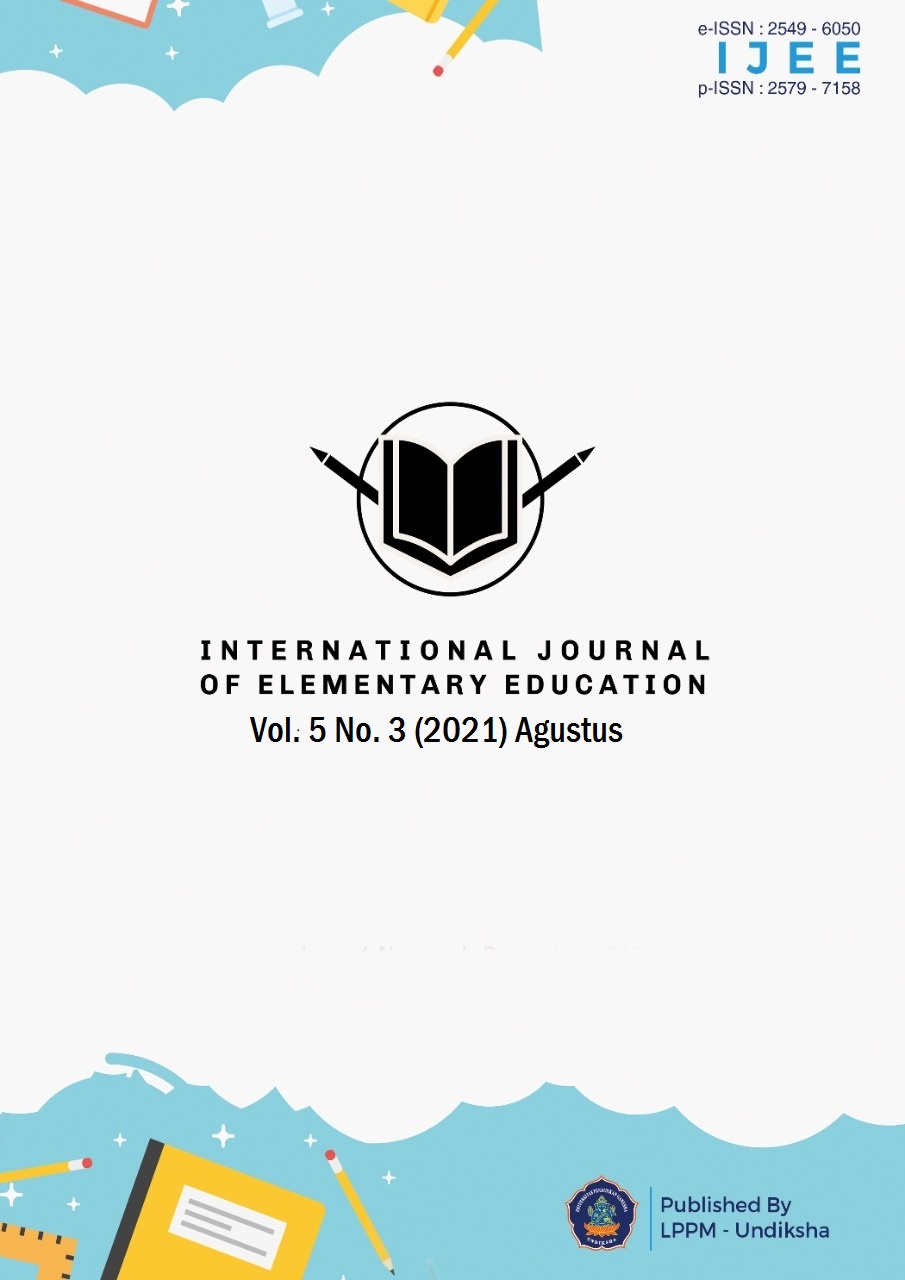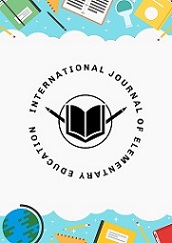Learning from Home Strategies in Private Elementary Schools During Covid-19 Pandemic
DOI:
https://doi.org/10.23887/ijee.v5i3.33548Kata Kunci:
Learning from Home strategy, Covid-19 PandemicAbstrak
The Indonesian government established a Learning from Home (BDR) policy related to learning during the Covid-19 pandemic. This article aims to analysis learning strategies from home during the Covid-19 pandemic in Indonesian private elementary schools. The research method was carried out in a descriptive qualitative manner. Collecting data through interviews, observation, and documentation. Data analysis in this qualitative research was started when the data collection took place, and after the data collection was completed within a certain period. The data analysis implemented content analysis techniques. Activities in data analysis included data reduction which summarized, chose the main points, focused on the important things, as well as looking for themes and patterns. Moreover, data display organized the data, arranged in a relationship pattern, so that it would be more easily understood. The research subjects were the principal (key informant), teacher, students, 2 guardians. The results of the analysis show that BDR is carried out using blended learning (synchronous and asynchronous). Synchronous implementation using social media (WA, IG, Zoom, Google meet) and school learning applications with a duration of 1-3 hours. Meanwhile, asynchronous is done by sending assignments/projects/questions via social media or the PANDHAWA application every day or once a week. Different strategies are following the readiness of schools, infrastructure, human resources, teachers, students, and parents. With various BDR strategies implemented, schools can overcome deficiencies and improve and develop the quality of learning.
Referensi
Adnan, M., & Anwar, K. (2020). Online Learning amid the COVID-19 Pandemic: Students’ Perspectives. Online Submission, 2(1), 45–51. https://eric.ed.gov/?id=ED606496.
Alrefaie, Z., Hassanien, M., & Al-Hayani, A. (2020). Monitoring Online Learning During COVID-19 Pandemic; Suggested Online Learning Portfolio (COVID-19 OLP). MedEdPublish, 9(1), 1–4. https://doi.org/10.15694/mep.2020.000110.1.
Ansari, N. J. R., Dhongade, R. K., Lad, P. S., Borade, A., Suvarna, Y. G., Yadav, V., Mehetre, A., & Kulkarni, R. (2016). Study of Parental Perceptions on Health & Social Needs of Children with Neuro-Developmental Disability and It’s Impact on the Family. Journal of Clinical and Diagnostic Research, 10(12), SC16–SC20. https://doi.org/10.7860/JCDR/2016/22538.9039.
Arifa, F. N. (2020). Tantangan Pelaksanaan Kebijakan Belajar dari Rumah dalam Masa Darurat Covid-19. Info Singkat; Kajian Singkat Terhadap Isu Aktual Dan Strategis, 12(7/I), 6. https://berkas.dpr.go.id/sipinter/files/sipinter-630-989-20200707165734.pdf.
Barker, R. O., Hanratty, B., Kingston, A., Ramsay, S. E., & Matthews, F. E. (2020). Changes in Health and Functioning of Care Home Residents over Two Decades: What Can We Learn from Population-Based Studies? Age and Ageing, 44. https://doi.org/10.1093/ageing/afaa227.
Batubara, H. H. (2016). Penggunaan Google Form sebagai Alat Penilaian Kinerja Dosen di Prodi PGMI Uniska Muhammad Arsyad Al Banjari. Al-Bidayah: Jurnal Pendidikan Dasar Islam, 8(1), 40–50. https://doi.org/10.14421/al-bidayah.v8i1.91.
Bloomberg, L. D., & Volpe, M. (2018). Completing Your Qualitative Dissertation: A Road Map from Beginning to End (4th ed.). SAGE Publications, Inc.
Bostan, S., Erdem, R., Öztürk, Y. E., Kılıç, T., & Yılmaz, A. (2020). The Effect of Covid-19 Pandemic on the Turkish Society. Electronic Journal of General Medicine, 17(6). https://doi.org/10.29333/ejgm/7944.
Chetty, M., Sung, J. Y., & Grinter, R. E. (2007). How Smart Homes Learn: The Evolution of the Networked Home and Household. Lecture Notes in Computer Science (Including Subseries Lecture Notes in Artificial Intelligence and Lecture Notes in Bioinformatics), 127–144. https://doi.org/10.1007/978-3-540-74853-3_8.
Chowell, G., & Mizumoto, K. (2020). The Covid-19 Pandemic in the USA: What Might We Expect? The Lancet, 395, 1093–1094. https://doi.org/10.1016/S0140-6736(20)30743-1.
Costa, P., Castaño-Muñoz, J., & Kampylis, P. (2021). Capturing Schools’ Digital Capacity: Psychometric Analyses of the SELFIE Self-Reflection Tool. Computers and Education, 162(November 2020). https://doi.org/10.1016/j.compedu.2020.104080.
Creswell, J. W., & Clark, V. L. P. (2017). Designing and Conducting Mixed Methods Research. SAGE Publications Inc.
Fauzi, I., & Khusuma, I. H. S. (2020). Teachers’ Elementary School in Online Learning of COVID-19 Pandemic Conditions. Jurnal Iqra’: Kajian Ilmu Pendidikan, 5(1), 58–70. https://journal.iaimnumetrolampung.ac.id/index.php/ji/article/view/914.
Hafermalz, E., & Riemer, K. (2020). Productive and Connected while Working from Home: What Client-Facing Remote Workers Can Learn from Telenurses about ‘Belonging through Technology. European Journal of Information Systems, 00(00), 1–11. https://doi.org/10.1080/0960085X.2020.1841572.
Harahap, M., & Siregar, L. M. (2018). Mengembangkan Sumber dan Media Pembelajaran. Educational, 10(January). https://doi.org/10.13140/RG.2.2.19282.86721.
Harpaz, Y. (2014). Teaching and Learning in a Community of Thinking: The Third Model. Teaching and Learning in a Community of Thinking: The Third Model. https://doi.org/10.1007/978-94-007-6940-3.
Jasinski, M.-A. (2012). Helping Children to Learn at Home: A Family Project to Support Young English-Language Learners. TESL Canada Journal, 29, 224. https://doi.org/10.18806/tesl.v29i0.1119.
Kautsar, A., & Edi, J. (2017). Pendidikan Karakter Religius, Disiplin, dan Bakat melalui Penigkatkan Kualitas Sarana Prasarana Sekolah. JMKSP (Jurnal Manajemen, Kepemimpinan, Dan Supervisi Pendidikan), 2(2), 259–278. https://doi.org/10.31851/jmksp.v2i2.1475.
Kersting, M., Henriksen, E. K., Bøe, M. V., & Angell, C. (2018). General Relativity In Upper Secondary School: Design and Evaluation of an Online Learning Environment Using the Model of Educational Reconstruction. Physical Review Physics Education Research, 14(1). https://doi.org/10.1103/PhysRevPhysEducRes.14.010130.
Kurniasari, A., Pribowo, F. S. P., & Putra, D. A. (2020). Analisis Efektivitas Pelaksanaan Belajar dari Rumah (BDR) Selama Pandemi Covid-19. Jurnal Review Pendidikan Dasar: Jurnal Kajian Pendidikan dan Hasil Penelitian, 6(3), 246–253. https://doi.org/10.26740/jrpd.v6n3.p246-253.
Leonard, L. (2016). Kompetensi Tenaga Pendidik di Indonesia: Analisis Dampak Rendahnya Kualitas SDM Guru dan Solusi Perbaikannya. Formatif: Jurnal Ilmiah Pendidikan MIPA, 5(3), 192–201. https://doi.org/10.30998/formatif.v5i3.643.
Masonbrink, A. R., & Hurley, E. (2020). Advocating for Children During the COVID-19 School Closures. Pediatrics, 146(3). https://doi.org/10.1542/PEDS.2020-1440.
Mellon, R. C., & Moutavelis, A. G. (2011). Parental Educational Practices in Relation to Children’s Anxiety Disorder-Related Behavior. Journal of Anxiety Disorders, 25(6), 829–834. https://doi.org/10.1016/j.janxdis.2011.04.003.
Murata, A., Bofferding, L., Pothen, B. E., Taylor, M. W., & Wischnia, S. (2012). Making Connections among Student Learning, Content, and Teaching: Teacher Talk Paths in Elementary Mathematics Lesson Study. Journal for Research in Mathematics Education, 43(5), 616–650. https://doi.org/10.5951/jresematheduc.43.5.0616.
Phelps, C., & Sperry, L. L. (2020). Children and the Covid-19 Pandemic. Psychological Trauma: Theory, Research, Practice, and Policy, 12, 73–75. https://doi.org/10.1037/tra0000861.
Plass, J. L., & Kaplan, U. (2016). Emotional Design in Digital Media for Learning. Emotions, Technology, Design, and Learning. .
Rasmitadila, Aliyyah, R. R., Rachmadtullah, R., Samsudin, A., Syaodih, E., Nurtanto, M., & Tambunan, A. R. S. (2020). The Perceptions of Primary School Teachers of Online Learning During the Covid-19 Pandemic Period: A Case Study in Indonesia. Journal of Ethnic and Cultural Studies, 7(2), 90–109. https://doi.org/10.29333/ejecs/388.
Salamah, U. (2017). Model Pembelajaran Tematik Pendidikan Agama Islam di Sekolah Dasar. Jurnal Pendidikan Agama Islam, 11(1), 119–132. https://doi.org/10.14421/jpai.2014.111-08.
Sanner, C. M., & Neece, C. L. (2018). Parental Distress and Child Behavior Problems: Parenting Behaviors as Mediators. Journal of Child and Family Studies, 27(2), 591–601. https://doi.org/10.1007/s10826-017-0884-4.
Setyaningrum, R. W. (2013). Model Pembelajaran Pendidikan Karakter pada Pembelajaran Tematik di SD Muhammadiyah 9 Kota Malang. Jurnal Pemikiran dan Pengembangan Sekolah Dasar (JP2SD), 1(1), 46. https://doi.org/10.22219/jp2sd.v1i1.1529.
Siregar, N. R. (2017). Persepsi Siswa Pada Pelajaran Matematika: Studi Pendahuluan pada Siswa yang Menyenangi Game. Prosiding Temu Ilmiah X Ikatan Psikologi Perkembangan Indonesia, 224–232. http://jurnal.unissula.ac.id/index.php/ippi/article/view/2193.
Spinelli, A., & Pellino, G. (2020). Covid-19 Pandemic: Perspectives on an Unfolding Crisis. British Journal of Surgery, 107(7), 785–787. https://doi.org/10.1002/bjs.11627.
Völker, K. (2018). Nasr Hamid Abu Zayd’s Philosophy on Islam and Education. In International Handbook of Philosophy of Education (pp. 17–28). Springer.
Wang, Q. (2019). Developing a Technology-Supported Learning Model for Elementary Education Level. Elementary School Forum (Mimbar Sekolah Dasar), 6(1), 141–146. https://doi.org/10.1109/ICAIE.2010.5641449.
Wardani, A., & Ayriza, Y. (2020). Analisis Kendala Orang Tua dalam Mendampingi Anak Belajar di Rumah Pada Masa Pandemi Covid-19. Jurnal Obsesi : Jurnal Pendidikan Anak Usia Dini, 5(1), 772. https://doi.org/10.31004/obsesi.v5i1.705.
Wilder, S. (2014). Effects of Parental Involvement on Academic Achievement: A Meta-Synthesis. Educational Review, 66(3), 377–397. https://doi.org/10.1080/00131911.2013.780009.
Zuo, L., Dillman, D., & Miller Juvé, A. (2020). Learning at Home During Covid-19: A Multi-Institutional Virtual Learning Collaboration. Medical Education, 54(7), 664–665. https://doi.org/10.1111/medu.14194.
Unduhan
Diterbitkan
Cara Mengutip
Terbitan
Bagian
Lisensi
Hak Cipta (c) 2021 International Journal of Elementary Education

Artikel ini berlisensiCreative Commons Attribution-ShareAlike 4.0 International License.
Authors who publish with the International Journal of Elementary Education agree to the following terms:
- Authors retain copyright and grant the journal the right of first publication with the work simultaneously licensed under a Creative Commons Attribution License (CC BY-SA 4.0) that allows others to share the work with an acknowledgment of the work's authorship and initial publication in this journal.
- Authors are able to enter into separate, additional contractual arrangements for the non-exclusive distribution of the journal's published version of the work (e.g., post it to an institutional repository or publish it in a book), with an acknowledgment of its initial publication in this journal.
- Authors are permitted and encouraged to post their work online (e.g., in institutional repositories or on their website) prior to and during the submission process, as it can lead to productive exchanges, as well as earlier and greater citation of published work. (See The Effect of Open Access)










